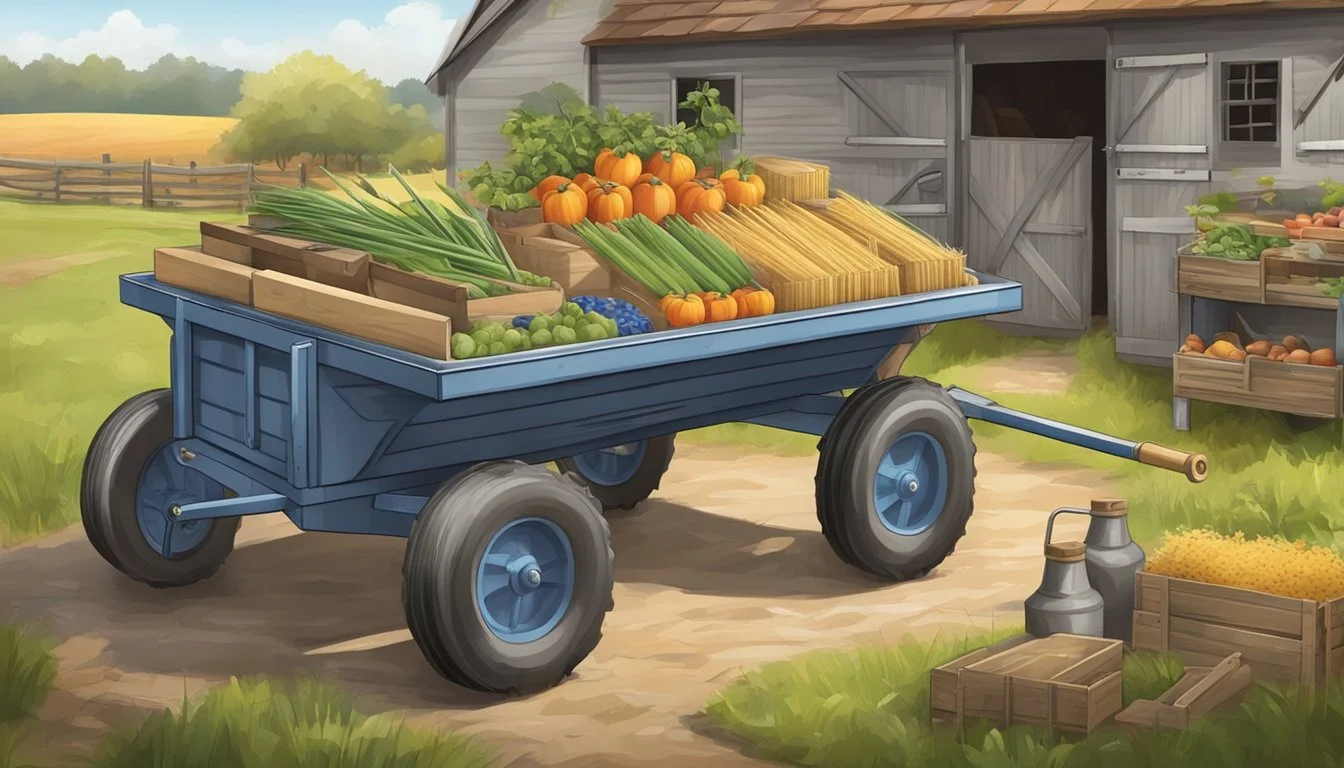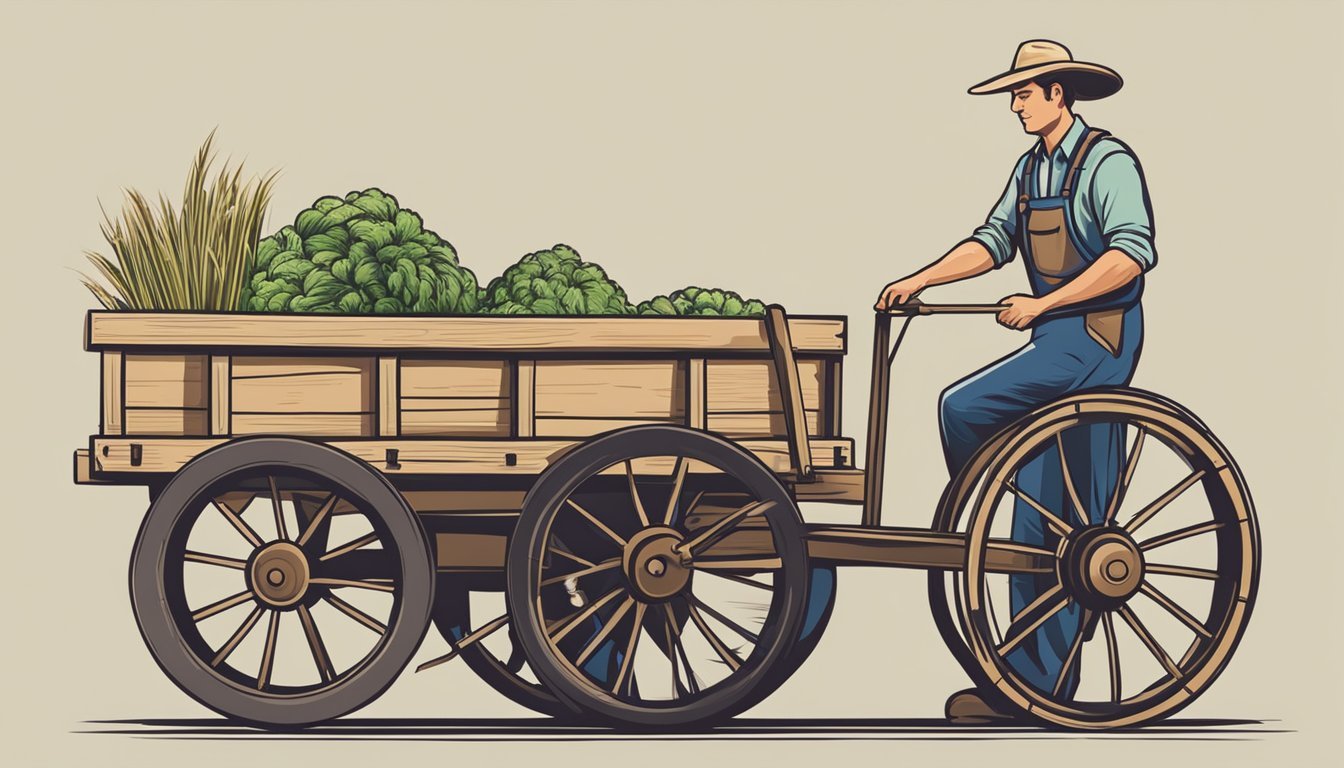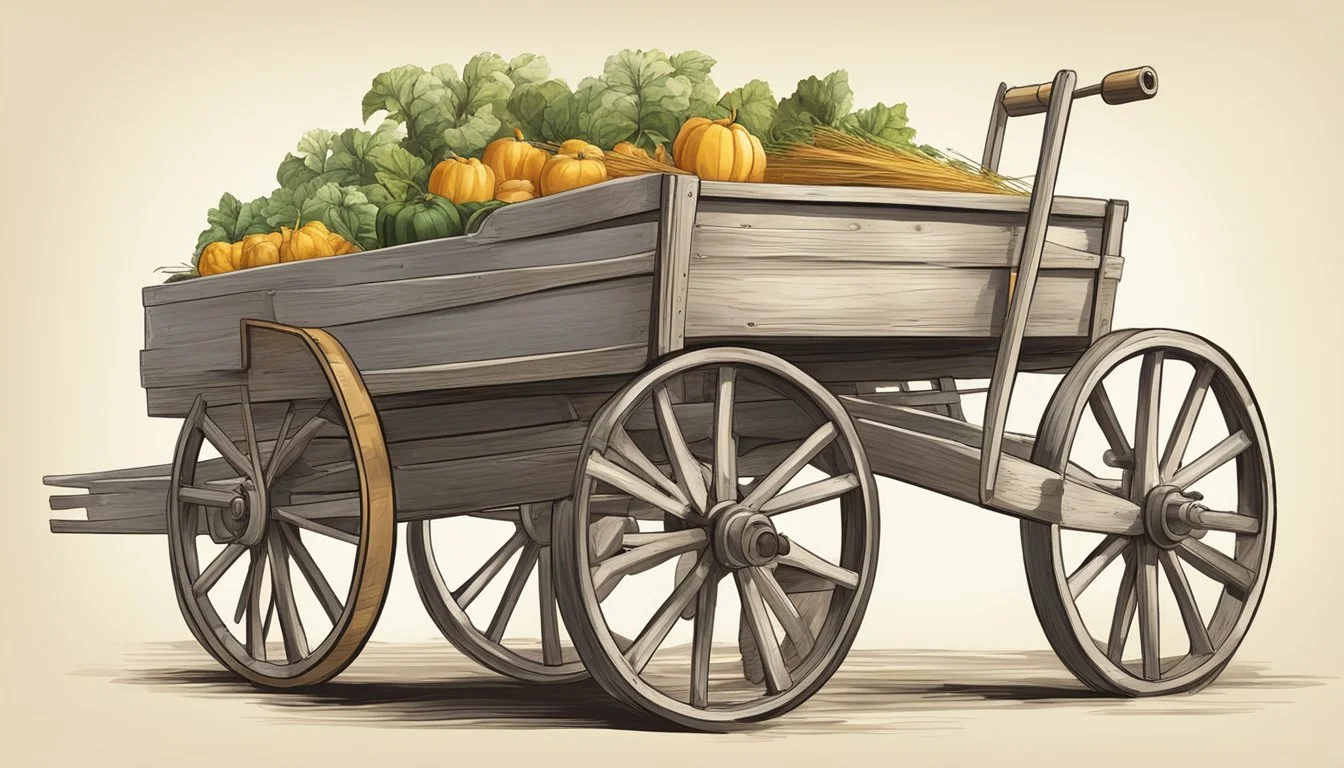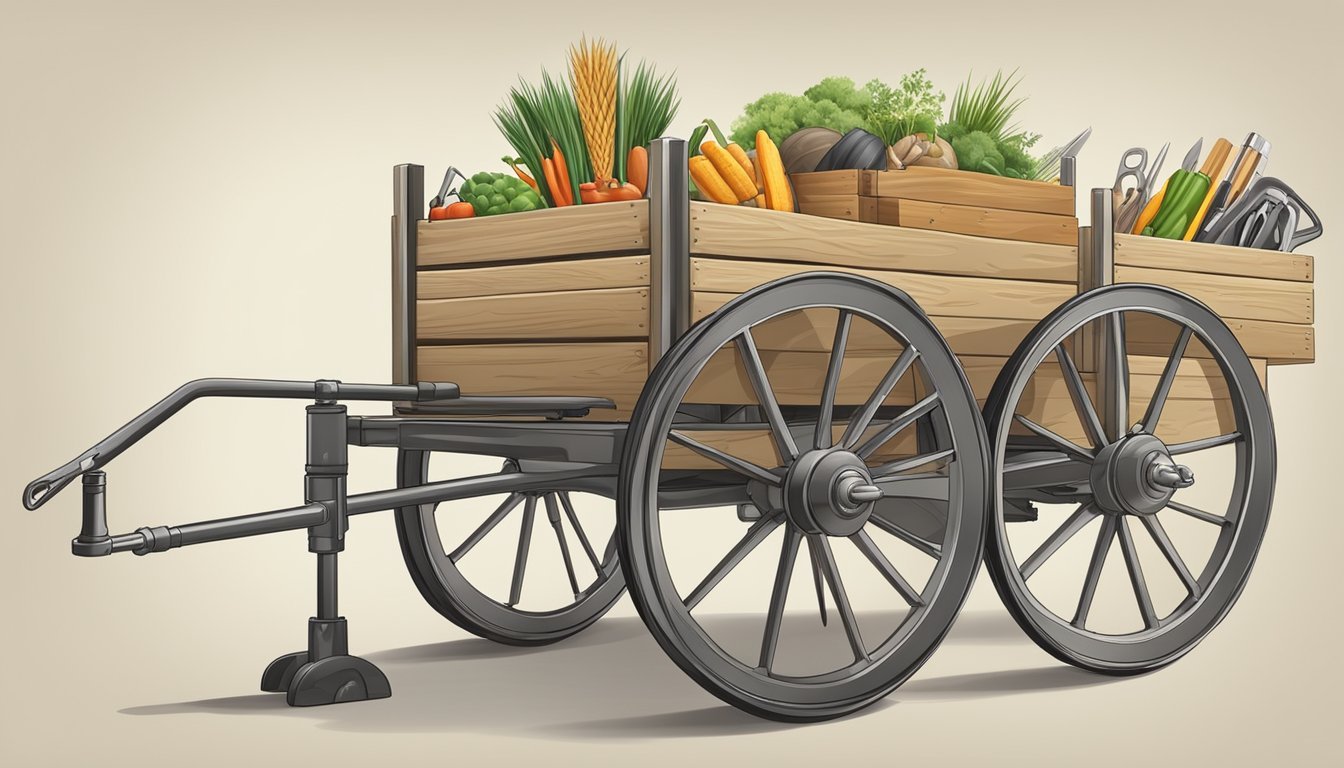The Ultimate Multi-Purpose Farm Cart
Versatility Meets Reliability in Agricultural Hauling
In the diverse landscape of farming, efficiency and versatility are key to managing day-to-day operations smoothly. An essential component that embodies both these traits is the multi-purpose farm cart, an innovative solution designed to shoulder the load of various supplies and equipment necessary for farm maintenance and productivity. This indispensable tool has evolved to fit the myriad of tasks that confront the modern farmer, from hauling feed and transporting tools to moving plants and soil across the farmstead.
The thoughtful design of these carts is aimed at reducing manual labor and increasing effectiveness. Durable construction ensures they can handle weights sometimes exceeding 350 pounds and are capable of tackling the rough terrain often found on farms. Features like adjustable handle heights, retractable kickstands, and pneumatic tires exemplify the tailored functionality that makes the multi-purpose farm cart a reliable companion in the agricultural setting.
Whether for small-scale gardeners or large-scale agricultural producers, theulti-purpose farm cart stands out as a go-to solution that supports the farmer’s needs. With the capacity for customization and accessories such as compatible muck tubs and foldable frames for easy storage, the multi-purpose farm cart is a testament to the adaptability required in the ever-changing world of farming. It simplifies a variety of tasks and represents an intelligent investment for those seeking to maximize their time and effort on the farm.
Multi-Purpose Farm Cart Designs
Selecting the ideal farm cart is crucial for efficiency and productivity in agricultural settings. Operators must weigh options between classic wheelbarrows and more robust dump carts, considering the must-have features and designs tailored to specific farm tasks.
Comparing Wheelbarrows and Dump Carts
Wheelbarrows are synonymous with simplicity. They generally wield a singular wheel for navigating garden beds and tight aisles, appropriate for lightweight materials and common gardening tasks. On the other hand, Dump Carts incorporate a more heavy-duty frame and often feature a tipping mechanism, making them preferable for transporting bulkier supplies. They’re typically balanced on two or more wheels, contributing to a sturdy and stable design capable of handling heavier loads.
Essential Features of a Sturdy Farm Cart
A sturdy farm cart should exhibit a frame capable of withstanding rough terrain and heavy use. Key features include:
Strong Material Construction: Steel or reinforced plastic frames ensure longevity and durability.
Ample Load Capacity: It should support the required weight for typical farm supplies and equipment.
All-Terrain Wheels: Large, rugged wheels are imperative for maneuverability across various surfaces.
Stability Features: Wide wheelbases and low centers of gravity prevent tipping when hauling heavy loads.
Specialized Farm Carts for Different Needs
The design of a farm cart can greatly influence its utility for specific tasks:
All-Terrain Utility Wagons are designed for diverse landscapes, sporting wheels adept for handling uneven, muddy, or rocky ground.
Some carts come with convertible handles or hitches to attach to ATVs or tractors for more efficient transportation across larger distances.
There are even foldable options to consider for farms with limited storage space or for transportation between different work sites.
Selecting the Right Farm Cart
When investing in a farm cart, a buyer should consider load capacity, durability, and terrain suitability to ensure efficient hauling of supplies and equipment.
Size and Load Capacity
The size and load capacity of a farm cart are critical factors for efficient farm operations. They must choose carts that can bear the weight of typical loads without overburdening the equipment. For moderate tasks, a 2-cubic foot cart might suffice, but for heavier loads, a cart with a capacity of 1,000 to 1,400 pounds might be necessary.
Small Gardens & Light Tasks: Up to 300 lbs.
Medium Farms & General Use: 300 - 600 lbs.
Heavy-Duty Needs: 600 - 1,400 lbs.
Materials and Durability
A farm cart's resilience hinges on the materials used in its construction. Metal carts are a reliable choice for heavy-duty hauling, offering longevity and strength. Steel utility carts, for example, can accommodate loads up to 1,400 lbs, making them a trusty option for intensive farm labor.
Plastic: Lightweight, less durable, suitable for light-duty tasks
Metal (Steel): Heavy-duty, durable, ideal for heavy loads
Wheel Types and Terrain Adaptation
Wheel design and quality ensure a cart can navigate various terrains with ease. Pneumatic tires are often preferred for their adaptability to uneven terrain and ability to absorb shocks. When selecting a cart, ensure the wheels are appropriate for the farm's terrain—be it rocky, muddy, or sloped.
Pneumatic Tires: For rough, uneven terrains
Solid Tires: For flat, smooth terrains
Number of Wheels: Two wheels for maneuverability, four wheels for stability
Versatility and Applications of Farm Carts
Farm carts have evolved to become a remarkably versatile tool essential for various tasks across a farm. Their design allows for multifunctional use, from gardening and animal care to transporting bulky sporting goods and outdoor equipment.
From Gardening to Livestock Management
In the context of gardening and livestock management, farm carts are indispensable. They serve as an agile means to transport soil, plants, and garden equipment swiftly across different terrains. For those caring for animals, these carts efficiently carry feed, bedding, and other supplies, making daily chores more manageable and less time-consuming.
Key Uses in Gardening:
Transporting soil and compost
Moving plants and garden tools
Hauling harvested produce
Key Uses in Livestock Management:
Carrying bales of hay and feed
Transporting tools for maintenance and repair
Assisting with waste management
Transporting Sports and Camping Equipment
When it comes to handling sports and camping gear, farm carts exhibit their adaptability. They can securely carry heavy equipment such as fishing rods, kayaks, or hunting gear, ensuring that these items can be moved to and from locations with ease. Similarly, camping essentials like tents, cookware, and sleeping bags can be organized and transported effortlessly.
Key Uses for Sports Equipment:
Hauling balls, nets, and other sports gear
Carrying fishing rods, tackle boxes, and coolers
Key Uses for Camping Gear:
Transporting tents, sleeping bags, and camp chairs
Holding cooking equipment and supplies
Hauling Firewood, Mulch, and More
The sturdiness of farm carts also makes them perfect for heavy-duty jobs such as hauling firewood and mulch. Their robust construction can withstand the weight and rough edges of firewood, and with a rust-resistant, leak-proof design, transporting mulch and other landscaping materials becomes a hassle-free task.
Key Uses for Firewood:
Loading and moving logs for home heating or outdoor fires
Transporting smaller kindling and wood chips
Key Uses for Mulch and Landscaping:
Hauling mulch for garden beds and walkways
Moving stones, bricks, and other hardscaping materials
Utilizing Farm Carts for Home Improvement
Farm carts have become an indispensable tool for homeowners tackling various home improvement projects. Their robust construction and versatility make them suitable for moving heavy supplies, managing waste, and enhancing overall efficiency.
Managing Backyard Projects
For backyard improvements, a farm cart serves as an essential vehicle for transporting materials. Whether one is building a new patio or setting up garden beds, these carts can handle heavy items like bags of cement, bricks, and large tools. The heavy-duty wheels allow for easy maneuverability across different terrains, ensuring that all necessary supplies are at hand where and when they're needed.
Moving Furniture and Large Household Items
When rearranging or upgrading home interiors, moving furniture can be challenging. Utilizing a farm cart for this purpose can simplify the process greatly. Here are key use cases:
Relocation: Farm carts facilitate the smooth rolling of sofas, tables, or large appliances from one room to another or even outdoors.
Protecting Floors: By loading furniture onto a cart, homeowners can prevent scratches and damage to flooring.
Debris and Yard Waste Removal
Farm carts exhibit their utility excellently in the context of yard maintenance. They can haul yard waste like fallen leaves, cut grass, and tree branches with ease. The capacity and durability of farm carts mean less frequent trips to the compost pile or trash disposal area. For larger clean-up tasks, the carts can be loaded with debris from renovation projects, effectively keeping the home and its surrounding environment tidy and clutter-free.
Ease of Use and Maintenance
The Ultimate Multi-Purpose Farm Cart stands out for its straightforward assembly and usability, as well as its minimal maintenance requirements to ensure longevity.
Assembly and User-Friendly Design
The farm cart is designed for easy assembly with a clear instruction manual that is also available online. Users can expect a heavy-duty construction that does not compromise on user-friendliness. All joints are precision-engineered for a seamless fit, facilitating a hassle-free setup.
Cleaning and Care for Longevity
To maintain the cart’s durability, regular cleaning is recommended:
Weekly Cleaning Checklist:
Rinse with water to remove loose dirt.
Use a mild soap solution for tougher stains.
Check for and remove any debris from moving parts.
Note: Proper care significantly reduces wear-and-tear, protecting the cart's heavy-duty materials.
Replacement Parts and Accessibility
In the event of wear or accidental damage, replacement parts for the Ultimate Multi-Purpose Farm Cart are readily accessible. Customers can order online directly from the manufacturer or through authorized dealers, ensuring they receive the correct and high-quality components to keep their cart in top condition.
The Role of Attachments and Upgrades
Attachments and upgrades elevate the utility of farm carts by enabling diverse functions from hauling to organized equipment transport. These adaptations turn a simple cart into a versatile farm asset.
Utilizing Tractor and ATV Hooks
Tractor and ATV hooks serve as crucial adaptations for the multi-purpose farm cart, allowing it to be towed effectively. Tractor integration typically involves a three-point hitch system, suitable for larger-scale jobs. Conversely, ATV hooks are designed for smaller carts, offering swift mobility across the farm. Both systems maximize the cart's utility by ensuring compatibility with different farm vehicles.
Adding Tool Holders and Cargo Rollers
Tool holders play a vital role by securing equipment during transit. Strategically placed on the cart, these holders ensure tools are readily accessible and prevent damage. Cargo rollers further enhance productivity by facilitating the loading and unloading process. These rollers, mounted on the cart's edge or base, allow heavy items to be moved with minimal effort.
Tool Holders: Improve organization and protect tools.
Cargo Rollers: Simplify loading/unloading, saving time and labor.
Innovative Features: Battery Power and Dumping Mechanisms
Farm carts integrated with battery-powered features deliver autonomy from manual labor, offering ease of movement and operation with a push of a button. The inclusion of dumping mechanisms, either manual or hydraulic, transforms the cart from a transport unit to a self-unloading tool, simplifying tasks like spreading soil or dispensing feed.
Battery Power: Offers motorized transport without physical strain.
Dumping Mechanisms: Streamlines the unloading process, enhancing efficiency.
Purchasing Considerations for Farm Carts
Selecting the right farm cart involves balancing cost with quality, understanding where to buy, and considering the after-sale services provided.
Assessing the Price-to-Quality Ratio
When purchasing a farm cart, buyers should scrutinize the price-to-quality ratio. It’s essential to invest in a cart that's made from durable materials and design elements that justify the price. Buyers should compare models, such as the Carts Vermont model 26, known for its reliability. Price comparisons should factor in the cart's capacity, durability, and ease of use to ensure the purchase is cost-effective in the long term.
Exploring Online and Local Purchase Options
One has multiple channels to consider when acquiring a farm cart; online and local dealerships. Online platforms might offer a wider selection, potentially lower prices, and the convenience of direct shipping to the farm. However, purchasing locally allows for the inspection of carts and immediate availability. When choosing between online or local options, consider shipping costs and timelines, which can significantly affect the overall cost and convenience of the purchase.
Warranty and Returns
A robust warranty and fair return policy are critical as they provide assurance against defects and post-purchase dissatisfaction. Before finalizing any purchase, customers should fully understand the terms of the warranty, its duration, and what components are covered. Furthermore, the ease of processing returns and the timeframe for accepting returns should be clear to avoid future complications. Reliable after-sales support can be a deciding factor in the purchase of a farm cart.
Farm Cart Safety and Operation
When operating a farm cart, users must prioritize safety by correctly balancing loads, navigating various terrains, and keeping the cart well-maintained. Adherence to these principles ensures both the longevity of the cart and the safety of the operator.
Proper Loading and Weight Distribution
It is imperative that one distributes weight evenly across the bed of the farm cart to prevent undue stress on the frame. An uneven load can cause tipping or make the cart difficult to maneuver. For instance, when using the two-wheeled Model 26 from Carts Vermont, users should place heavier items in the middle, ensuring stability during transport.
Center of Gravity: Keep heavier items low and centered.
Load Limits: Do not exceed the recommended capacity, such as 350 pounds for some Miller Manufacturing models.
Handling Inclines and Edges
When navigating inclines, the operator must be cautious of the cart’s load and center of gravity to prevent accidents. Always pull or push the cart directly up or down the hill, rather than at an angle, to minimize the risk of tipping.
Incline Approach: Face inclines head-on; avoid oblique angles.
Edge Awareness: Stay clear from edges or uneven ground where the cart could tip or fall.
Maintenance for Safe Performance
Regular maintenance is crucial for safe operation. Check the integrity of the cart's construction periodically, paying close attention to the wheels and handle.
Wheels: Inspect for proper inflation and signs of wear.
Joints and Handles: Tighten any loose bolts and ensure that the handle is secure for reliable control.
Surfaces: Look for any signs of rust or structural damage that could weaken the cart.
Future of Farm Carts
Farm carts continue to evolve, adopting new technologies that increase their functionality and sustainability. The following subsections outline these developments, focusing on advancements in engineering, environmental consciousness, and community roles.
Technological Advancements in Farm Cart Engineering
Advancements in engineering are making farm carts more versatile and efficient than ever before. Industry designers are integrating modern materials and technologies, such as lightweight composites and automated control systems. These innovations contribute to carts that are easier to maneuver and more durable, capable of withstanding the rigors of daily farm work. For example, electric-powered drive systems enable farmers to handle their weekend and household yard work with less effort.
Environmental Considerations and Sustainability
Sustainability has become a priority in the design of farm carts. Manufacturers are increasingly using recycled materials and implementing designs that reduce environmental impact. Solar-powered carts are on the horizon, aiming to reduce the reliance on fossil fuels. By opting for environmentally friendly materials and energy sources, farm carts contribute to a smaller carbon footprint. It's not just about meeting the needs today, but ensuring that resources are conserved for future generations.
Community Use and Local Farming Initiatives
Farm carts are playing a pivotal role in community farming initiatives. They facilitate local food production by enabling easy transportation of goods and tools, fostering local economies, and supporting small-scale farms. The versatility of farm carts is engineered to meet a variety of household needs, from garden maintenance to hauling supplies. Communities are recognizing the value of shared resources, and farm carts are increasingly seen as a tool that can support collaborative farming and community sustainability projects.








